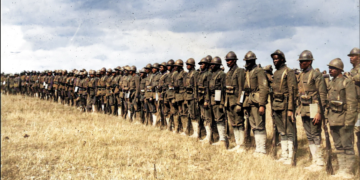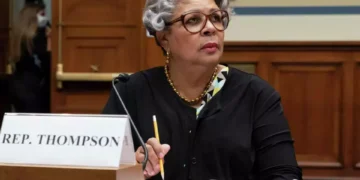Feb 20, 2025 Story by: Publisher
One of the big reasons President Trump is limiting AP reporters’ White House access is to protest what aides see as years of liberal word choices that the wire service’s influential stylebook spread across mainstream media, according to top White House officials.
The Associated Press (AP) capitalizes “Black” when used in a racial, ethnic, or cultural context, recognizing a shared history, identity, and community among those who identify as Black, including individuals within Africa and the African diaspora. Meanwhile, “black” remains lowercase when referring to color rather than people. However, AP continues to lowercase “white” in racial, ethnic, and cultural contexts.
Then and now, AP disputes the accusation that its Stylebook favors a political party, movement, or ideology. Lauren Easton, AP’s vice president of corporate communications, told Axios the news service “doesn’t align with any particular agenda.” AP provides style guidance to members and customers “and it is up to them what they choose to use,” she said.
Additionally, AP capitalizes “Indigenous” when referring to the original inhabitants of a place.
These updates align with the existing practice of capitalizing distinct racial and ethnic identifiers, such as Latino, Asian American, and Native American. AP considers inclusivity, respect in storytelling, and the natural evolution of language when making style and language decisions.
Following a review and consultation process, AP determined that there was less support for capitalizing “white” at this time. “White people generally do not share the same history and culture, or the experience of being discriminated against because of skin color,” AP noted. Furthermore, as a global news organization, AP acknowledged the ambiguity, disagreement, and confusion surrounding the term’s definition in many parts of the world.
AP recognizes that white skin color plays a role in systemic inequalities and injustices and remains committed to addressing these issues in its journalism. However, it expressed concern that capitalizing “white,” as commonly done by white supremacist groups, could unintentionally lend legitimacy to such ideologies.
Some critics argue that failing to capitalize “white” creates inconsistency and suggests discrimination against white people, while others believe it implies that “white” is the default racial category. Others have suggested that capitalizing “white” could further engage white individuals in discussions on race and equality.
- The Stylebook advises that “Black” should be used for racial descriptions while the lowercase “black” is considered just a color. AP says “white people’s skin color plays into systemic inequalities and injustices, and we want our journalism to robustly explore those problems. But capitalizing the term white, as is done by white supremacists, risks subtly conveying legitimacy to such beliefs.” AP notes that white people “generally do not share the same history and culture, or the experience of being discriminated against because of skin color.”
- Limiting use of the word “riot”: AP says that “focusing on rioting and property destruction rather than underlying grievance has been used in the past to stigmatize broad swaths of people protesting against lynching or police brutality or for racial justice, going back at least to the urban uprisings of the 1960s in the U.S.”
An AP statement says: “Limiting our access to the Oval Office based on the content of AP’s speech not only severely impedes the public’s access to independent news, it plainly violates the First Amendment.”
AP will continue monitoring the usage and evolving perspectives on these language choices and plans to periodically review its decision.

















